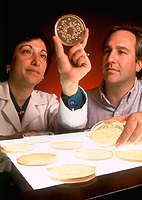Microbiologist

Microbiologists examining cultures on a Petri dish
|
|
| Occupation | |
|---|---|
|
Activity sectors
|
Biotechnology, Government, Research, Environmental, Academia |
| Description | |
|
Related jobs
|
Scientist, Educator |
The term "microbiologist" comes from the Greek mīkros meaning "small" βίος, and bios, meaning "life" -λογία, combined with -logia meaning one who studies. A microbiologist (from Greek μῑκρος) is a biological scientist who studies microscopic life forms and processes or works in the field of microbiology. Microbiologists investigate the growth, interactions and characteristics of microscopic organisms such as bacteria, algae, fungi, and some types of parasites and their vectors. They contribute much to the field by trying to understand and learn about the interaction between these microbes and the environment and also among themselves and other organisms. Most microbiologists are qualified to work in offices and/or research facilities, such as a laboratory as well as in the academia. There, they conduct experiments that help them analyze microbes and their importance. A microbiologist's work is often repeated or improved in order to establish accurate research. Most microbiologists specialize in environmental, food, agricultural, industrial or medical aspects of microbiology including: virology (the study of viruses); immunology (the study of mechanisms that fight infections); bioinformatics (the methods for storing, retrieving, organizing and analyzing biological data) and Bioremediation (using microbes as environmental mitigation strategies). Many microbiologists use biotechnology to advance the understanding of cell reproduction and human disease. Some microbiologists have contributed to knowledge of pathogens and disease-causing microbes. While others, study their interaction with the environment and their use as potential environmental pollution cleaners.
...
Wikipedia
